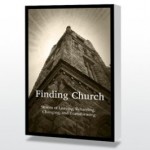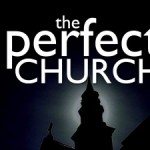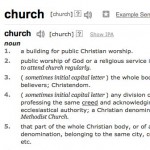Finding Church: the book project and the blog series
Jeremy at “Till He Comes” is putting together a book project called “Finding Church.” The subtitle of the book is “Stories of Leaving, Returning, Changing, and Transforming.” Last week, Jeremy provided a list of contributors in his post “Finding Church Contributors.”
In his post, Jeremy lists the contributors in each of four categories: Changing Church, Leaving Church, Reforming Church, and Returning to Church. I’m currently listed under all of those lists in the nefarious category of “Not Sent in the Story (but said they will!!!).” My story is complete and is on its way to Jeremy. Hopefully, he’ll decide to use it.
(By the way, it looks like he will still accept submissions in the next week if you’re interested in taking part in his project.)
I’m excited about reading different people’s stories. I find that God usually uses these stories to help me understand where other people are in their journeys with Christ.
I’m also excited about taking part, and I’m excited about the story that I’ve submitted. To be honest, I’ve been in a bit of a writing slump lately, and I have two big writing projects that I need to finish. So, hopefully, this will jump-start my own writing.
But, also being honest, when I start writing my submission, I struggled with which category to write for. In fact, in some ways, different parts of my own story could fit in each of the four categories in Jeremy’s project: Changing Church, Leaving Church, Reforming Church, and Returning to Church.
In the end, I decided to write on the topic of “Reforming Church.” Although, like many things that I write, I perhaps took a little different view of “Reforming Church” than you might expect.
However, I did enjoy thinking through each of the four categories, and I don’t want to lose those thoughts. So, I’ve decided to write a short blog series to go along with Jeremy’s book project.
For the next four days (five posts counting this one), I’m going to look at each of the four categories of Jeremy’s upcoming book Finding Church. I’ll write about how my own journey with Jesus Christ can fit into the categories of changing church, leaving church, reforming church, and returning to church.
But, what about you? If you were to write about your own journey with Jesus Christ, which of those categories do you think your life would best fit in? Why would you pick that category?
Guest Blogger: What is wrong with the word “Church”?
I’ve invited several people to write “guest blog posts” for this blog. There are several reasons for this: 1) To offer different perspectives. 2) To generate even more discussion and conversation between blogs. 3) To introduce other bloggers to my readers.
(If you are interested in writing a guest blog post, please contact me at aknox[at]sebts[dot]com.)
Today’s post was written by Marc Winter. You can connect with Marc via his Facebook page.
——————————————-
What is wrong with the Word “Church”?
When we use the word “church” in our everyday conversations, we say things like: “Where do you go to church?” or “I will meet you at the church.” Most people understand that Jesus did not mean He would build a building; “And the gates of hell will not prevail against it.” But we continue to use this word; a word that in our current and historical usage means: a building where religious services are held. The King James Version translates the Greek word “ekklesia” as “church” 80 times in the New Testament. No wonder we have this word “church” stuck in our heads and in our vocabulary.
Language is the fundamental method we use for conveying information and understanding. When translating the Scriptures, the changing of one word can literally change the world, and in this case it has.
Jesus did not say in Matthew chapter 16, “I will build my church”. He did say, “I will build my ekklesia (ek-klay-see-ah).” The ekklesia is correctly translated: “called out assembly or community”. The word “church” is taken from the Greek word “kuriakon”(koo-ree-ak-on’), not “ekklesia”. Kuriakon, means: belonging to the Lord. Specifically, in the first century it was commonly understood to be a temple or house in which pagans worshiped their gods. We should ask why the word ekklesia was incorrectly translated “church” meaning a building, when the correct meaning was clear. When King James and Arch Bishop Bancroft set up 14 rules to be followed in translating the scriptures into English, the third rule required “the old ecclesiastical words to be kept, such as “church” instead of “congregation.” They also wanted the old offices of bishop, deacon, and pastor to relate to their “most common use by the most eminent fathers” (rule four). There was a deliberate focus on translating words favorably to the Anglican Church (of which King James was the head) to maintain control over the people. Without a building to gather the people around, the clergy, the pope, and to some degree, the king, would have lost control over the people. Even today without the use of buildings, the clergy and all denominations would lose control over the people.
When my wife and I read our English Bibles we insert the word “ekklesia” when we read or discuss what was incorrectly translated as “church”. The use of the word “church” has contaminated our hearts and minds to the Lord’s true purpose for His called out assembly or community. We get building focused, and we get clergy focused, which is exactly what King James, Bancroft and the spiritual forces behind them intended.
Remember the movie The Matrix? Church is just a prison built for your mind. When you know the truth, the truth will set you free.
All Comments Welcomed.
The church is not the institution. The institution is not the church.
The title of this post came from my good friend Eric at “A Pilgrim’s Progress” and his post “Not the Same.”
In the post, Eric is making a distinction between the church and the organizations and institutions that are often created by the church. I think this is an important distinction. Why is it important? Because these organizations and institutions (in all of their varieties and flavors) tend to overshadow and even hinder the work of the church.
Eric writes:
The church is not the institution. The institution is not the church. They are not the same. In fact, they are fundamentally different. The first is God’s creation. The second is man’s. They not only differ but in many ways oppose each other.
This has become increasingly clear to me over the past few months. It has helped me in discussing the things of the church. For quite a while I’ve been frustrated with the way things at large are going within the church in this country. This was because I saw so many man-made traditions shackling the life of the church. It all seemed like one big jumbled mess to me.
Yes, it is “one big jumbled mess.” And, it is often confusing to the people involved. What part is the church? What part is the organization? What part is of God and what part is of man? It really is “one big jumbled mess.”
Please take the time to read the rest of Eric’s post. I agree with him that understanding that there is a difference between the church and the organization/institution is the first step in recognizing the church.
Then, what happens when we DO recognize the church? At this point, brothers and sisters in Christ make different decisions. Some decide to separate from the organization/institution. Some decide to continue with the organization/institution. Perhaps others make other decisions.
For me, the important part is living in Jesus Christ with the church – either with the help of or in spite of the organization/institution.
Which decision have you made, and why?
The ONE church that Jesus is building
I love Aussie John (from “caesura“). Love him! I wish I could afford to fly to Australia and spend a few days, or weeks, or months talking with him and learning from him. Since he started commenting on this blog a few years ago, he has made it a richer experience for myself and my readers.
Last weekend, he published a post called “Is it possible?” He begins by asking if what we call “Christianity” today is actually the greatest enemy of Christ. Strong words, yes, but perhaps strong words like this are necessary at times.
Towards the end of the post, he touches on a subject that is very dear to my heart: the church. He writes:
The Scriptures do reveal the characteristics of the churches of New Testament times, and the principles by which they functioned, yet we certainly do not have a clear, indelible blueprint according to which churches are to be set up or formed!
With all our sincere desires and efforts to have a “New Testament church”, is it possible that all we are actually achieving is the development of a myriad of other systems, or sects, with differing sets of legalistic rules, traditions, and regulations, sectarian bigotry, and remaining as spiritually lifeless as those we have left behind in the trash-can of our experience of searching for the church that suits our imaginings or tastes.
There is only ONE Church, the one Jesus is building, which is a dynamic living organism, from which rivers of living water flow. Its source is ONLY in the person of Jesus Christ. And built upon the cornerstone of His practice and completed work.
His church is totally dependent on Him through the working of His Holy Spirit in its members.
I’m often asked, “Why do you remain associated with a denomination (and I am) if you believe that denominations tend to divide the church (and I do believe that)?” Why? Because the people who are part of this denomination are my brothers and sisters in Christ and are, therefore, part of the church that Jesus is building.
I’m often asked, “Why do you continue to carry out some of the traditional rituals/practices if you believe that these are not necessary and may hinder spiritual growth?” Why? Because the people who have chosen to continue using these practices are my brothers and sisters in Christ and are, therefore, part of the church that Jesus is building.
I’m often asked, “Wouldn’t it be better to move away from this organization and/or denomination and start with a clean slate and meet in a manner that you think is more like the characteristics of the church that we see in the New Testament?” No, it is better to remain in fellowship with my brothers and sisters in Christ who are part of the church that Jesus is building.
No, the buildings and systems and hierarchies and programs and activities and rules and confessions and denominations are not the church. But, those people are your brothers and sisters in Christ, and they ARE the church.
There is one church. Separating from our brothers and sisters in Christ – even because we don’t agree with how they understand the church – is not the answer. The answer is living together in the fellowship of the Spirit and in the church that Jesus is building, in spite of our differences.
Thank you, Aussie John, for reminding us of this great truth in Jesus Christ!
Replay: Defining the Church
Five and a half years ago (in September 2006), I had only been blogging for a few months. But, I wrote one of my first (of many) blog series tackling the difficult topic of defining the “church” (or ἐκκλησία – ekklesia) from Scripture. Actually, in this series, I primarily looked at a few passages in the Gospels and Acts. But, hey, it was a start.
The first post (“replayed” below) was called “Defining the Church 1 – Matthew 16:15-19.”
It’s interesting reading back through the series now. I would probably say a few things differently, but, for the most part, I think I was heading in the right direction.
Here is the first post in the series. Links to the other posts are at the bottom of this post and each of the other posts.
———————————————-
Defining the Church 1 – Matthew 16:15-19
I plan to post a series that I am calling “Defining the Church.” My desire is to examine passages of Scripture that define/describe the church; and, through that examination, to develop a basic definition of the church.
The first passage is Matthew 16:15-19 –
He (Jesus) said to them (His disciples), “But who do you say that I am?” Simon Peter answered and said, “You are the Christ, the Son of the living God.” Jesus answered and said to him, “Blessed are you, Simon Bar-Jonah, for flesh and blood has not revealed this to you, but My Father who is in heaven. And I also say to you that you are Peter, and on this rock I will build My church, and the gates of Hades shall not prevail against it. And I will give you the keys of the kingdom of heaven, and whatever you bind on earth will be bound in heaven, and whatever you loose on earth will be loosed in heaven.”
There are several things that we can learn about the church from this passage:
- The church belongs to Christ.
- Christ will build His church.
- The church will be built upon Peter.
- Death will not defeat the church.
- The church will be granted authority from Christ.
The church belongs to Christ. This seems obvious. Jesus says, “I will build my church.” The community (ἐκκλησία = “assembly, community”) of believers will be the possession of Christ himself. This is demonstrated throughout Scripture, especially when the church is called “the church of God” (Acts 20:28; 1 Cor 1:2, 10:32, 11:22, 15:9; Gal 1:31; 1 Tim 3:5, 15; 1 Pet 4:17).
Christ will build His church. Again, Jesus accepts responsibility for building his community. He does not place this responsibility on anyone else. He does not assign this responsibility to anyone else. Does this mean that people play no role in building the church? No. But, it does mean that people must understand their role in relation to Christ’s role. As Paul stated: I planted, Apollos watered, but God gave the increase. So then neither he who plants is anything, nor he who waters, but God who gives the increase (1 Cor 3:6-7; i.e., 1 Pet 2:5).
The church will be built upon Peter. There are three interpretations of this passage. 1) The church will be built upon Peter who becomes the first bishop of the church. 2) The church will be built upon the confession of faith that Peter makes. 3) The church will be built upon Peter – and others like him – because Peter is a believer and follower of Christ. I believe the third explanation comes closest to explaining this passage. The church is built of believers and followers of Jesus Christ. Again, Paul explains this in 1 Cor 3: You are God’s field, you are God’s building (1 Cor 3:9).
Death will not defeat the church. This is another contested passage. This could indicate that the church will wage a spiritual warfare against the “forces of Satan,” but the church will not be defeated. Or, it could indicate that death (Hades) will not defeat the church, whether death comes naturally or as a result of persecution. The one who dies will not be separated from the church. The church that remains will not be defeated by death or persecution. I believe this latter explanation is most valid. The church is not frail, nor is it on the verge of destruction. The existence of the church is promised by Christ himself.
The church will be granted authority from Christ. I will discuss this and the phrase “whatever you bind on earth will be bound in heaven, and whatever you loose on earth will be loosed in heaven” in the next post.
From this passage, we learn that the church is built and owned by Christ. He builds his church with those who believe and follow him. We also learn that Christ grants some type of authority to the church, and that death will not defeat the church.
————————
Series:
- Defining the Church 1 – Matthew 16:15-19
- Defining the Church 2 – Matthew 18:15-20
- Defining the Church 3 – John’s Farewell Discourse
- Defining the Church 4 – Acts 1-2
- Defining the Church – Implications
There are no perfect churches
I can’t tell you the number of times that I’ve been part of a conversation about the church, when the other person seeks to end the conversation by saying something like, “Well, there are no perfect churches.”
The point, I assume, is that since there are no perfect churches, then there is no reason to seek to be perfect. Usually, of course, these conversations center around the differences between what I understand about the church and what the other person understands about the church.
The other person, at some point, might admit that there are problems with his or her understanding of the church, but, as is often said, “there are no perfect churches.”
I agree with that statement. Churches are gatherings of people. There are no perfect people, and so there are no perfect churches. I have no problem with that statement. Instead, I’m concerned about what is typically meant by that statement: since there are no perfect churches, then you should not expect us to change, even if we are imperfect.
But, there’s a huge difference between imperfect, and seeking to grow and change and become more like the church that is described in Scripture.
Believe it or not, I’m not surprised when people disagree with me. I’m not taken aback. I don’t separate from people or stop fellowshiping with them because they disagree with me about the church. As long as someone is in Christ, then I accept that person as a brother or sister, and attempt to treat them as such.
But, I think there’s a problem with accepting imperfect churches without seeking to grow and change.
Paul addressed many imperfect churches. He wrote to churches among which there were many different kinds of problems; some with problems understanding who God or Jesus Christ is; some with problems understanding how to respond to the gospel; some with problems understanding the end times; some with problems concerning the church itself.
The only group of believers that he almost separate from were the churches in Galatia. He almost separated himself from them because they were walking away from the gospel. However, he did not separate from them right away, but instead wrote to them to help them understand their error.
For the others, he accepted them as brothers and sisters as they were. He called them saints (holy ones). He called them children of God. He recognize that they were indwelled by the Holy Spirit. In spite of the fact that they were imperfect churches, the accepted them.
But, he did not want them to stay the way they were. He wanted them to grow and mature in their relationship with God and also in their relationships with one another. He knew they would never be a perfect church, but he wanted them to continue growing, changing, and maturing.
I think this should be our view of ourselves as well. We are in Christ, but we are still growing in our understanding of him and what it means to live according to the Spirit that is in us. We are not perfect, but we should be maturing.
In the same we, churches are not perfect either. However, we should be surprised if we are not continually growing and changing and maturing as individuals and as churches.
No, there are no perfect churches. But, there should be no static churches either.
God does not view your local church as distinct from other local churches in your area
So, I made a claim in the title of this post with which some will readily agree and with which some with just as readily disagree: God does not view your local church as distinct from other local churches in your area.
In Scripture, we do see examples of groups of believers meeting together regularly in certain locations. For example, Paul tells the Christians in Rome to greet the church in Prisca and Aquila’ house. (Romans 16:5) He also tells them to greet the brothers and sisters who were with Asyncritus, Phlegon, Hermes, Patrobas, and Hermas (Romans 16:14) and to greet the saints who were with Philologus, Julia, Nereus and Olympas. (Romans 16:15)
It seems clear from these greetings that Paul knew that these believers normally met together in some way. However, this does not mean that these groups of believers were distinct from one another. The very fact that Paul could address one letter to all of these believers and more indicates that he did not view them as distinct but somehow connected with one another.
This connection was not simply some kind of spiritual connection. Even today, people say, “Sure, we’re all part of the same church.” But, then, there is very little – if any – real indication or demonstration of this unity and fellowship. It is a unity in name only.
If you work with another brother or sister in Christ – spend most of your day in the same location as that person – then you are (in reality) part of the same church with them, whether or not the two of you recognize it and live it out and whether or not the two of you are part of the same “local church.” If you live next door to another brother or sister in Christ then you are (in reality) part of the same church with that person, whether or not the two of you recognize it and live it out and whether or not the two of you are part of the same “local church.”
We cannot choose to love, serve, teach, encourage, etc. those who are part of a certain “local church” but not recognize our responsibility and privilege of serving other brothers and sisters who are part of our lives but who may not be part of the same “local church” as us.
In reality, the modern concept of the “local church” – a concept and division of the church that began during the Reformation – is a division among the church that is outside the scope of Scripture. There is nothing in Scripture written specifically about or to the “local church” but the “local church” – as it is understood and practiced today – is not found in Scripture.
So, let’s not let the concept and boundaries set up by modern “local churches” separate us from brothers and sisters in Christ that God brings into our lives. We are responsible for one another in Christ, whether or not we are part of some “local church” organization together.
The organization may not be the church, but the church may be there
When I write about the church, I usually begin by explaining that I am referring to the people of God as they gather together. The church is not an organization or some type of corporate or hierarchical entity or a denomination or anything like that. It’s not a building. It’s not a set of rules or beliefs or codes. It’s not an event or a service. The church (as the Greek term “ekklesia” signifies) is a gathering or assembly of God’s people.
Of course, at the time that the New Testament was written, the term “ekklesia” alone (without any other context) did not necessarily refer to an assembly of God’s people. It simply referred to a gathering or assembly of people. In different contexts and with different modifiers, the term could refer to many different types of gatherings from political to social to educational to occupational etc.
But, the Greek term “ekklesia” always referred to groups of people. Today, if we use the term “church” to refer to anything other than God’s people, then we are not using it in the same way that the New Testament authors used the term “ekklesia.”
But, let’s be honest. People use the English term “church” to refer to many different things. And, many times, the term is not used to refer to a group of people. Often, the term church is used to refer to a specific building. The building is NOT the church. But, the church may be gathered in that building from time to time.
Sometimes, the English term “church” is used to refer to a certain organization or corporation with bylaws and organizational leadership etc. This organization/corporation is not the church. But, the church may meet together under auspices of that organization.
The term “church” is often used to refer to a specific event or service. That event or service is not the church. However, the church may be present at that event.
Some denominations or others types of associations may refer to themselves with the English term church. These types of organizations are not the church. However, the church may affiliate with those denominations or organizations in certain ways.
So, I don’t always agree with the ways that people use the English term “church.” Of course, this is my personal concern since the English term “church” is not actually found in Scripture and has a much wider range of definitions than the Greek term “ekklesia” that it is often used to translate. [We had a good discussion about this in a post a few years ago when I asked the question, “Should we use the word ‘church’?“]
But, this post is not really about whether or not we should use the word “church” and it’s not even about whether or not people use the word “church” in a manner that is similar to the use of the term “ekklesia” in the New Testament.
Instead, the point of this post is this: even when people use the term “church” in a way that does not refer to a gathering of the people of God, the people of God are often there. This is the church. And, we should care about, love, serve, teach, encourage, etc. those who are gathered, regardless of how they use the term “church.”
We are all brothers and sisters in Christ, regardless of how we use the term “church.”
Replay: Blurring the distinctions between “local” and “universal”
Five years ago, I wrote a post called “Blurring the distinctions.” The purpose of that post is to show that the distinctions that we often make between “local church” and “universal church” are not as easy to find in Scripture. In fact, when Paul is writing about the church, he often uses terms and descriptions that alternate back and forth between what we would often call “local church” and “universal church.”
So, why is this important? Well, if the authors of Scripture do not make a distinction between “local church” and “universal church,” then perhaps we should not make that distinction either.
———————————-
John S. Hammett is a wonderful professor. He not only allows for discussion, he also encourages it. He has written a book describing Baptist ecclesiology: Biblical Foundations for Baptist Churches.
He begins his book by describing the biblical foundations of the nature of the church. He states, “Local and universal is the most widely used terminology for the twofold meaning for ekklesia found in the New Testament.” In fact, his discussion of the church hinges on the local and universal distinctions that he finds throughout Scripture.
For example, when discussing the “Body of Christ” as an image of the church, he says, “Interestingly, the use made of the body image in Romans and 1 Corinthians differs markedly from the use in Ephesians and Colossians, so much so that they need to be examined separately. In Romans and 1 Corinthians, the body of Christ is a metaphor for the local church, and the emphasis is on the relationships the members of the body have with one another… [I]n Ehesians and Colossians, the body is related to the universal church.”
I do not think it is that simple. Instead, Scripture often blurs the distinctions between what we now call the “local church” and the “universal church.” I do not believe that these distinctions are scriptural. For example, Paul uses the body metaphor in three passages in Ephesians:
And he put all things under his feet and gave him as head over all things to the church, which is his body, the fullness of him who fills all in all. (Eph. 1:22-23 ESV)
There is one body and one Spirit- just as you were called to the one hope that belongs to your call- one Lord, one faith, one baptism, one God and Father of all, who is over all and through all and in all. (Eph. 4:4-6 ESV)
Rather, speaking the truth in love, we are to grow up in every way into him who is the head, into Christ, from whom the whole body, joined and held together by every joint with which it is equipped, when each part is working properly, makes the body grow so that it builds itself up in love. (Eph. 4:15-16 ESV)
The first two passages seem to align with our use of the term “universal church.” But, in the last passage, Paul is using very intimate language that seems to correspond with our use of the term “local church.” In other words, Paul has no problem blurring the distinctions between “local church” and “universal church.” Why? I don’t think Paul sees the same distinctions that we normally see.
If the ekklesia (church) of Christ is God’s children gathered together…
I’ve suggested on this blog (many, many times) that the Greek term ekklesia (which has been translated “church”) refers to a gathering of people (or “assembly”). This means that God’s ekklesia (God’s church) is an assembly of people who belong to him – that is, a gathering of people who are disciples of Jesus Christ.
I’m not suggesting anything that hasn’t been written countless times in books, articles, and posts at other blogs: “ekklesia” refers to an assembly of people. Therefore, “God’s ekklesia” refers to an assembly of God’s people.
(By the way, I’ll use “ekklesia (church) of God” and “ekklesia (church) of Christ” interchangeably, because both phrases are used in Scripture. I use those phrases to designate God’s people gathered together from other assemblies of people. I do not use them to refer to any particular denomination or organization, even if some denomination/organization might use the same phrase to refer to itself.)
What would happen – what difference would it make – if we truly lived and acted as if God’s people gathered together was ekklesia (church)?
… a group of Jesus’ disciples gathered in a home or cafe would be ekklesia, but so would a group gathered in a designate building with a steeple.
… a group of God’s children who do not have recognized leadership would be church, but so would a group that has a hierarchy of leadership.
… a group of believers who meet irregularly would be ekklesia, but so would a group that had regularly scheduled meetings.
… a group of disciples who meet without any activities planned or scheduled would be church, but so would a group that followed a set plan – even a lectionary.
… a group of Jesus’ followers who are eating together would be ekklesia, but so would a group that was singing hymns and listening to a sermon.
Of course, I could go on and on. And, I purposely began with the descriptions that are often used among those who prefer to gather in ways that are more organic/simple/relational/etc. But, I could have swapped the left and right side of the statements above.
We are ekklesia (church) when we are gathered together with other brothers and sisters in Christ.
(Of course, this does NOT mean that every way of living, leading, gathering, etc. together are as beneficial as others. However, THAT is a different point.)
So, I ask again… What would happen – what difference would it make – if we truly lived and acted as if God’s people gathered together was ekklesia (church)?









